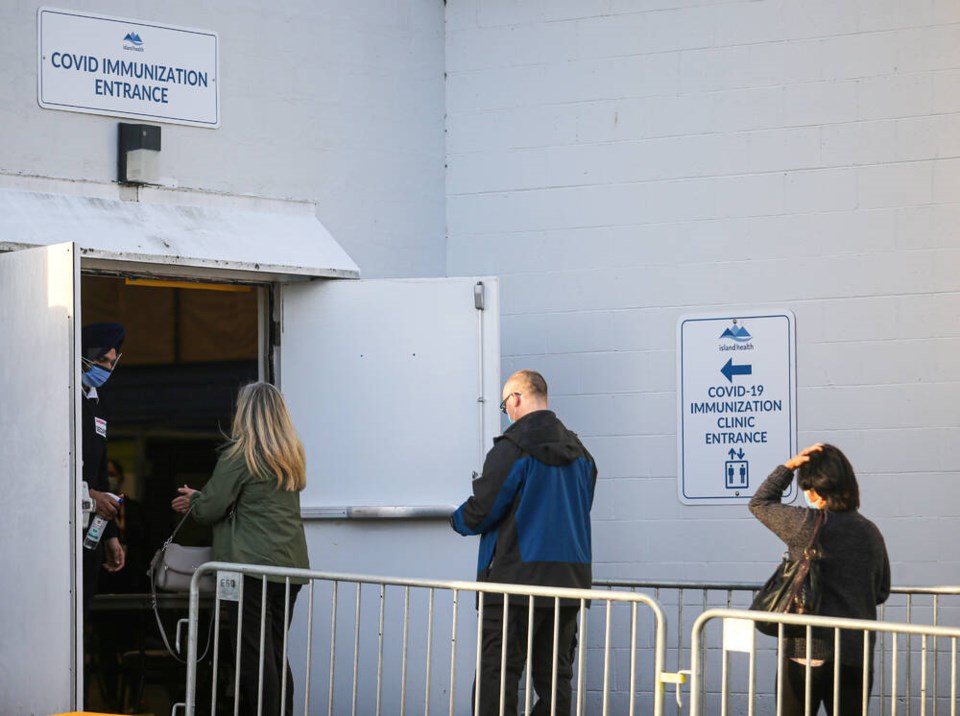High rates of COVID-19 driven by the Omicron variant are expected to continue over the next few weeks, which means restrictions on gatherings and events will remain, at least for the short-term, provincial health officer Dr. Bonnie Henry said Tuesday.
While a decline in cases may come soon — typically, the faster case counts rise, the faster they fall — more people continue to test positive and hospitalizations, which lag behind positive tests, are rising, she said. Many of those now in hospital with COVID-19 have the Delta variant.
“We still don’t know the full effect that Omicron and the rates of hospitalization that we’re seeing now are going to have on our health-care system and the level of care that’s going to be required in the coming weeks,” she said.
Three of those with COVID in intensive care in B.C. are unvaccinated people in their 20s, while another person in their 30s is in critical care in an ICU, Henry said.
She said it’s very distressing for health-care workers to care for young people who could have avoided through vaccination the severe complications that COVID‑19 can cause. “This wave is moving quickly and it means you need to do everything to protect yourself right now.”
On Tuesday, B.C. reported 2,239 new cases of COVID-19, of which 562 were in Island Health, for a total of 36,087 active cases in the province, 4,330 of which are in Island Health.
Two of four new health-care-facility outbreaks reported Tuesday were in Island Health — at Saanich Peninsula Hospital and Oyster Harbour in Ladysmith. That brings the total in B.C. to 45, including nine on the Island.
Asked about the high number of vaccinated and previously infected people acquiring COVID, Henry said with the highly transmissible Omicron, vaccination may not prevent being infected, as it might have with previous variants, especially for those who are older and immune-compromised. But vaccination is a way to avoid becoming seriously ill and hospitalized. “The likelihood of severe illness and hospitalization remains very, very low” for those who have been fully vaccinated, said Henry.
From Jan. 3 to 9, the breakdown of new COVID cases per 100,000 after being adjusted for age was: 462.5 unvaccinated, 195.4 partially vaccinated, and 336.1 fully vaccinated.
Hospitalizations adjusted for age per 100,000 the week prior were: 33.1 unvaccinated, 11.7 partially vaccinated, and 5.8 fully vaccinated.
Henry said a person who has two doses of COVID vaccine is “60 to 70 per cent less likely” to need hospital care from COVID six months out from that second shot.
“The majority of hospitalizations, and in particular the majority of people who are in our ICU needing critical care right now, continue to be people who don’t have that protection that vaccination gives,” said Henry.
A booster shot six months after the second shot can reduce the chances of contracting the Omicron variant by 50 per cent and reduce serious illness and hospitalization by 80 to 90 per cent, said Henry. Plus it gives longer-lasting protection into the future.
“That longer-lasting protection means whatever comes next, it’s going to help protect us from that as well,” she said.
Until then, Henry reminded people to keep social connections outside and virtual when possible, and to restrict social circles to one or two families. Children who do extracurricular sports and activities should consider choosing one, she said.
“We need to really make sure that we’re prioritizing the essential aspects of school and perhaps limiting activities outside of school — so maybe one key activity rather than three or four,” said Henry.
On the heels of federal Health Minister Jean-Yves Duclos’ comments Friday that all provinces may soon have to consider mandatory vaccination to deal with escalating case counts that threaten to overwhelm the health-care system, Henry said she doesn’t foresee making vaccination mandatory in B.C.
The province has already mandated vaccines for some health-care workers and long-term care staff, said Henry.
As for Quebec’s announcement that unvaccinated individuals will have to pay a surcharge to receive health care — Quebec Premier Francois Legault has said the fee will be significant — B.C. Health Minister Adrian Dix said no similar measures will be taken in B.C.
“But we will be continuing our strong efforts to ensure that everyone gets vaccinated,” said Dix. “We won’t be taking the same action as Quebec.”
Later this month, Henry expects to report on additional treatment options — antiviral medications — that are under review by Health Canada.
Meanwhile, Dix said more rapid tests are coming to B.C.
B.C. has received a total of 4.85 million rapid tests and and is deploying more than half — 2.85 million — to key strategic areas, said Dix.
A previous supply of tests that require special equipment or need to be administered by trained health-care professionals or that are in packages that can’t be broken down easily are being used at the discretion of medical health officers to manage clusters and outbreaks.
Tests that can be self-administered are to be sent to acute-care facilities for testing of symptomatic health-care workers and to schools to test symptomatic staff.
B.C.’s seniors advocate Isobel Mackenzie has argued long-term care staff and visitors — regardless of symptoms — should frequently be given rapid tests to protect care residents.





